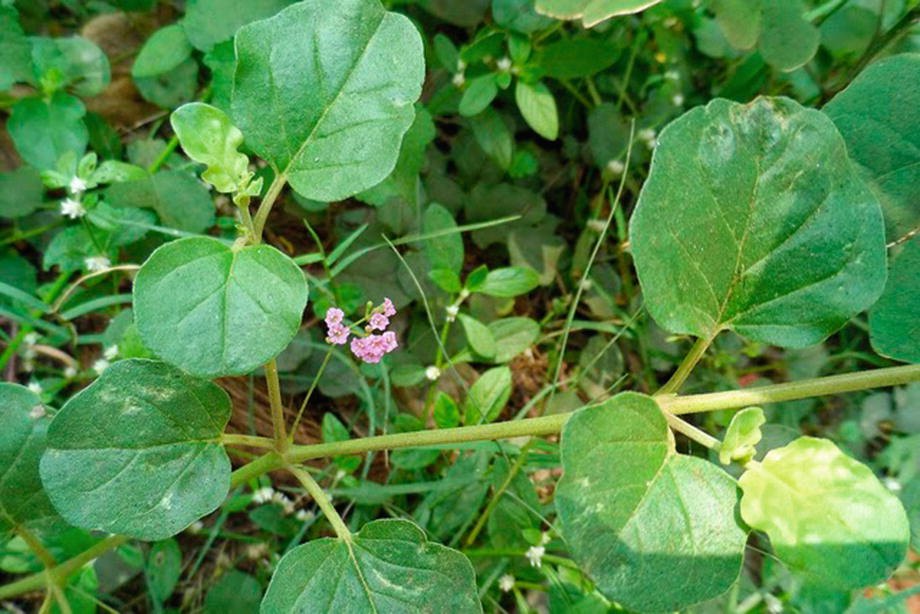Punarnava (Boerhavia diffusa) or 4’O clock plant is considered as an important herb in the Ayurvedic pharmacopoeia as it is a tridoshic herb that can pacify Vata, Pitta and especially Kapha dosha. The name ‘Punarnava’ translates as “the one that renews the old body.”

Properties of Punarnava according to Ayurveda
- Rasa (taste): Madhura (sweet), Tikta (bitter) and Kashaya (astringent).
- Anu Rasa (After taste): Kashaya (astringent)
- Guna (Quality): Ruksha (dry) and Laghu (light)
- Veerya (potency): Ushna (hot)
- Rakt punarnava: Sheet veerya (coolant)
- Vipaka: Madhura (undergoes sweet taste conversion after digestion)
- Parts used: Roots (primarily used) and the whole plant.
Medicinal Properties of Punarnava:
- Cardioprotective (protects the heart).
- Uricosuric (expels excess uric acid).
- Anti-inflammatory (reduces inflammation).
- Nephroprotective (protects kidneys).
- Rasayana (rejuvenating).
- Mild diuretic
- Lithontriptic (dissolves stones).
- Anti-tussive
- Protects the liver
Its internal use is indicated in:
- Edema
- Kidney stone
- Alcoholism
- Fever and infections
- Ascites
- Rheumatoid Arthritis
- Liver disorders
- Splenomegaly
- Hepatomegaly
- Jaundice
- Cough due to heart disease
- Asthma
- Gout
- Chronic kidney failure
- Nephrotic syndrome
- Uterine inflammation
External Application:
- Itchy eyes – with milk
- Conjunctivitis – with cow ghee
- Watery eyes – with honey
- Skin diseases due to Vata and Kapha doshas – with curd
- Vatakantaka (plantar fasciitis) – oil of punarnava is used for heel massage
Punarnava – Benefits and Uses:
The list of Punarnava benefits is extensive, stretching back thousands of years. It is particularly revered in Ayurveda for its unique ability to gently detoxify the body of excess liquids and stagnation. Some of its benefits and uses are:
- Edema: Due to the accumulation of excess watery fluids in the cells, tissues and cavities, edema occurs. Due to mild diuretic action, punarnava is quite useful in edema.
- It reduces swelling in all types of edema except lymphatic obstruction.
- Kidney disorders: Punarnava has nephroprotective action due to which it is helpful in albuminuria (proteins in the urine), glycosuria (sugar in the urine) etc.
- In a similar way, it is useful in nephrotic syndrome as well.
- In renal failure, this herb helps in reducing creatinine and urea level in the blood and improves kidney function as well.
- It also prevents breathing difficulties in the patient with end-stage kidney disorder.
- Being a mild diuretic, it helps in treating oliguria.
- Punarnava has lithontriptic action due to which it helps in dissolving kidney stones.
- Inflammation: Punarnava is considered as an excellent anti-inflammatory herb in Ayurveda. This action appears on all the internal organs including all organs of abdomen, bones and joints, uterus, lungs and airways, kidney, heart and uterus.
- The inflammation of the lining tissues of uterus known as endometriosis is also treatable with Punarnava. In such cases, the decoction of punarnava is proved beneficial as it reduces inflammation and gives relief from uterine pain.
- Jaundice: Punarnava is one of the potent herbs which helps in reducing bilirubin levels successfully without causing any side effects. For jaundice, its decoction is highly beneficial.
- Cardiac Disorders: If edema occurs due to heart disease, then Punarnava is highly beneficial due to its cardioprotective action.
- It protects the heart from further damage.
- In such cases, Punarnavadi Kashayam is beneficial.
- Arthritis: Punarnava has powerful analgesic and anti-inflammatory properties due to which it is extremely beneficial in reducing joint and muscular pain.
- A paste of grounded leaves of the herb effectively provides relief in pain and inflammation associated with arthritis.
Punarnava Dosage
The classical dosage of punarnava varies according to its variants:
- For infants and children: 80 mg/kg of body weight
- Adults: 2.5 – 5 gm
How to take
- Anupan (adjuvant): Water or milk
- Medication time: best on empty stomach or 60 minutes before taking meal.
In many parts of the country, punarnava is used as a vegetable also. Its vegetable is very beneficial for those who are suffering from anemia, heart disorders etc. but there is a need to popularize this herb as a vegetable.
Some Ayurvedic formulations containing Punarnava:
- Punarnava Mandoor
- Punarnavadi Guggulu
- Narayan oil
- Punarnavarishta
- Sukumaram kashayam
Disclaimer:-
This article is not a substitute to the standard Medical Diagnosis or personalized Ayurvedic Treatment! It is intended only for Information!
For experts consultation, please write us at care@blessayurveda.com
1,992 total views, 4 views today